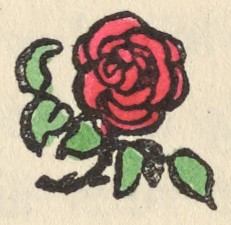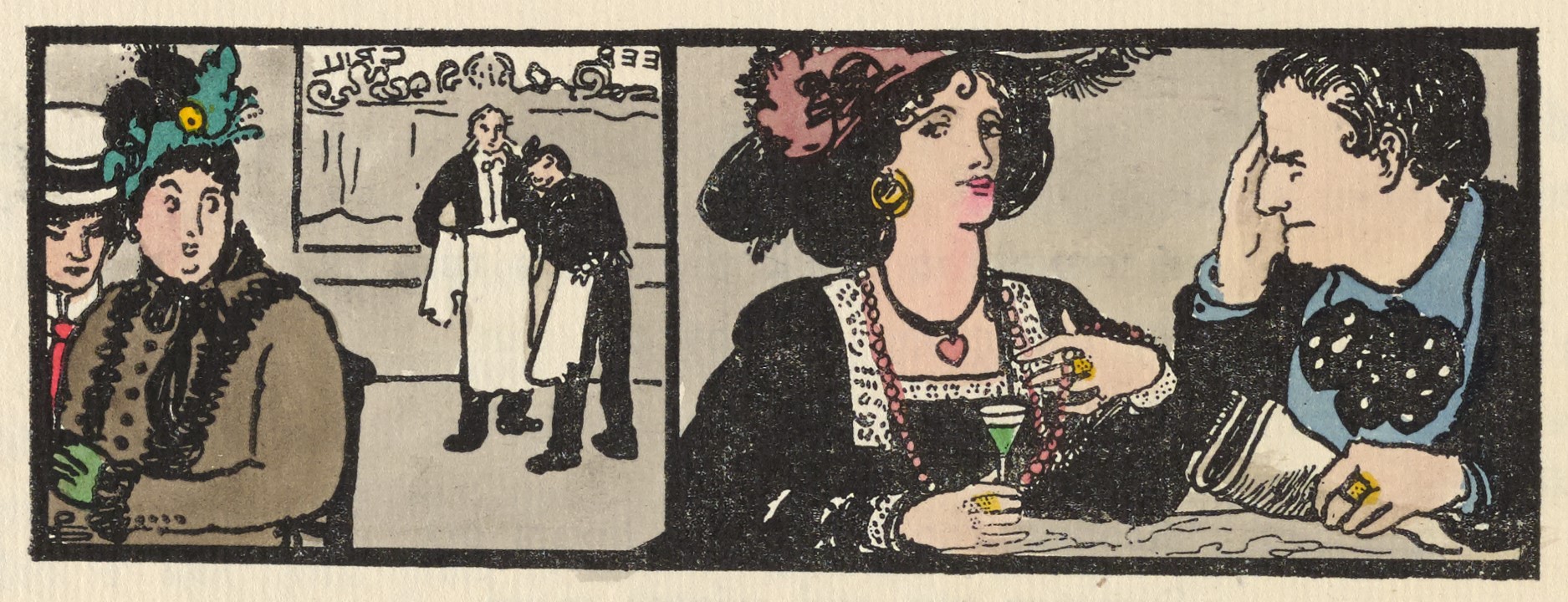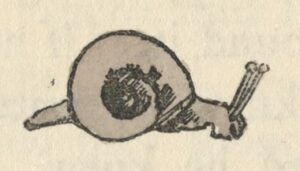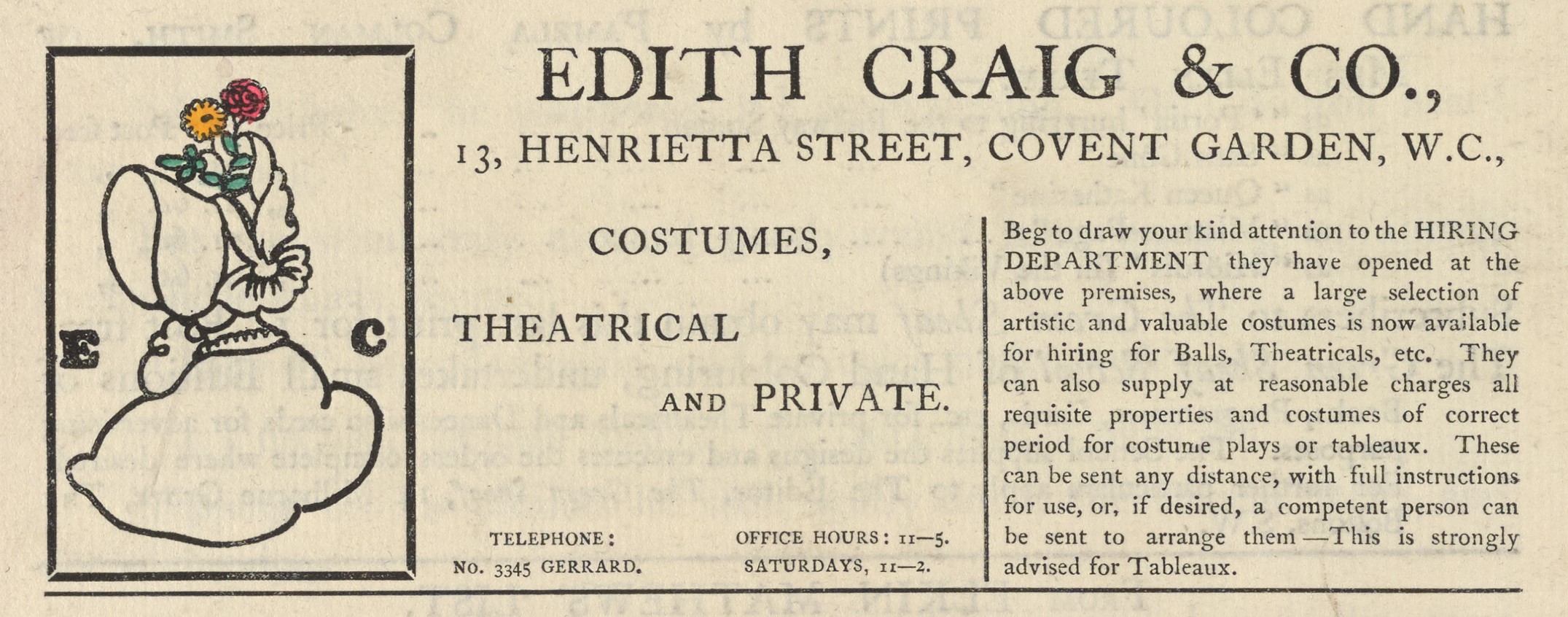TABLE OF CONTENTS
No. 5
Front Cover, by Pamela Colman Smith [i]
The Dreamer and the World, by Cecil French 2
Cael and Credhe, translated by Lady Gregory 3-5
Illustration by Pamela Colman Smith 5
The Fairy Dance, poem by Alix Egerton 6
Page Decoration by Pamela Colman Smith 6A
A May Madrigal, by John Todhunter 7
The Lament of the Lyceum Rat,” story by Mary Brown 8-10
Headpiece Illustration by Pamela Colman Smith 8
Illustration by Pamela Colman Smith 9
Page decoration by Pamela Colman Smith 10
Time, by Pamela Colman Smith 11
The Turning of the Tide, by Cecil French 11
Page decoration by Pamela Colman Smith 11
“Juveniles,” by Bernhard Smith 12
Illustration by Pamela Colman Smith 12
Will o’ the Wisp, by Leslie Moore 13-14
Pictorial Initial by Cecil French 13
Page decoration by Pamela Colman Smith 14
Advertisements 15-16
Advertisement for Edith Craig & Co., illustrated by Pamela Colman Smith 16
CAEL AND CREDHE.
Translated from the Irish by Lady Gregory.
It was on the hill they called Finntulach, the White Hill, the Fianna gathered together
the time they were going to fight the battle of Fintraighe. They often stopped on
that hill for a while, and they had every sort of thing there for food, beautiful
black-
berries, haws of the hawthorn, nuts of the hazels of Cinntire, tender twigs of the
bramble bush, springs of wholesome gentian, watercress in spring-time. And there
would be brought to their cooking pots birds out of the oak woods, and squirrels from
Berramain, and speckled eggs from the cliffs, and salmon out of Linnmhuine, and eels
of
the Sionnan, and woodcocks of Fidhrinne and otters from the hidden places of the
Doile, and fish from the coasts of Buie and Beare, and dulse from the bays of Clire.
And as they were going out towards Finntraighe they saw one of their young men,
Cael, grandson of Nemhnain, coming towards them. “Where is it you are coming from,
Cael?” Finn asked him. “From the Brugh that is to the North,” said he. “What
were you asking there,” said Finn. “ I was asking to speak with Muirenn, daughter
of
Derg, that was nurse to myself.” “For what cause,” said Finn. “It was about a high
marriage, and a sweetheart of the Sidhe that was showed to me in a dream, Credhe,
daughter of the king of Ciarraighe Luachra.” “Do you know this, Cael,” said Finn,
“that she is the greatest deceiver of all the women of Ireland, and there is hardly
a good thing in Ireland but she has it coaxed away to her own house.” “And do
you know what it is she asks of every man that comes to ask for her?” said Cael.
“I know it,” said Finn; “she will let no one come unless he is able to make a poem
setting out a report of her horns and her cups, her grand vessels and all her palaces.”
“I have all that ready,” said Cael; “it was given to me by Muirenn, my nurse.”
They gave up the battle then for that time, and they went on over hilly places and
stony places till they came to Loch Cuire in the west of Ireland. And they came to
the door of the hill of the Sidhe and knocked at it with the shafts of their long
gold-
socketted spears. And there came young girls having yellow hair to the windows of
the sunny-houses, and Credhe herself, having three times fifty women with her, came
out to speak with them. “It is to ask you in marriage we are come,” said Finn then.
“Who is it is looking for me?” said she. “It is Cael the brave, the hundred-killer,
grandson of Nemhnain son of the King of Leinster in the East.” “I have heard
talk of him, but I have never seen him,” said Credhe. “And has he any poem for
me?” she said. “I have that,” said Cael, and he rose up then, and he sang his poem.
The Green Sheaf
“A journey I have to make, and it is no easy journey, to the house of Credhe
against the breast of the mountain, at the Paps of Dana; it is there I must be going
through hardships, through the length of seven days.
“It is pleasant her house is, with men and boys and women, with druids and
people of music, with cup-bearer and doorkeeper, with horse-boy that does not leave
his
work, with distributor to share food; and Credhe of the fair hair in command over
them all. It would be delightful to me in her house, with coverings and with down,
if
she has but a mind to listen to me.
“A bowl she has with juice of berries in it for darkening her eyebrows; crystal
vats of fermenting grains; beautiful cups and vessels. Her house is of the colour
of
lime; there are rushes for beds and many coverings of silk and many blue cloaks; red
gold, and bright drinking horns.
“Her sunny-house is beside Loch Cuire, it is made of silver and yellow gold; its
ridge is thatched without any fault, with the crimson wings of birds. The doorposts
are green, the lintel is of silver taken in battle; Crede’s chair, to the left, is
the delight
of delights, covered with gold of Elga; at the foot of her pleasant bed it is, the
bed that
was made of gold and precious stones by Tuile in the east. Another bed there is to
the
right, of gold and silver, made without any fault; curtains it has with the appearance
of
the flower of the foxglove.
“The people of her house, it is they that have delight; their cloaks are not faded
white, they are not worn smooth; their hair is fair and curling. Men in their
wounds would sleep hearing the singing of the birds of the Sidhe on the eaves of her
sunny-house.
“If I owe any thanks to Credhe, to whom the cuckoo calls, she will get better
praise again than this; if the love service I have done is pleasing to her, let her
not
delay, let her say ‘your coming is pleasing to me.’
“A hundred feet there are in her house from one corner to another; twenty feet
fully measured is the width of her great door; her roof is thatched with the wings
of
blue and yellow birds, the border of her well is of crystal and carbuncles. There
is a
vat there of the bronze of kings, the juice of pleasant malt is running from it; over
the
vat is an apple tree with its heavy fruit. When Credhe’s horn is filled from the vat
four apples fall into it together.”
The Green Sheaf
“She that owns all these things at low water and at flood, Credhe from the hill of
the three paps, she is beyond all the women of Ireland by the length of a spearcast.
“Here is this song for her; it is no sudden bride-gift, no hurried asking. I bring
it to Credhe of the beautiful shape that my coming may be very bright to her.”
After that Credhe took him for her husband, and the wedding feast was made, and
all the Fianna stopped there through seven days, at drinking and pleasure, and in
want
of no good thing.
THE FAIRY DANCE.
Strange, how she heard the music calling
All the day long till night was falling,
Then away and away from the homes of men,
She sped through the depths of the haunted glen
To the far hill-top where the grass is worn,
By the dancers’ feet, to a shaven lawn.
And there she danced, through the summer night,
With fairy folk in the blue moon-light,
Swaying and dancing the hours away
In the fairy ring on the Eve of May.
And none can forget who that music hear,
For its echoes ring in the listener’s ear;
And whoever with fairy hands enlaced
Has but once through those mystic mazes paced
They may wander away the whole world o’er,
Yet echoing strains from the Fairy Shore
Come calling them back to the far green hill,
Where the good little people are dancing still;
And the moons may wax and the moons may wane,
That calling may never be heard in vain.
Oh, many the spirits of wandering maids
That are drawn back there in the evening shades,
For she who has taken the Fairies’ dole
Will never know rest for her aching soul,
You may tell, from her walk and her eyes so still,
The girl who has danced on the Fairy Hill.
Alix Egerton.
A MAY MADRIGAL.
May comes clad in gleaming gold,
The World grows young that was so old,
All so sweet, all so fair,
Birds are singing everywhere:
Come away!
Come sing and answer them again,
Answer Boys and Girls again,
And welcome in the May!
Mary guard the woods from teen,
Donning now their virgin green!
All be fair, all be sweet
Where in the woodlands lovers meet!
All who love true
Come and charm the woods with song,
Glad voices charm the woods with song,
And welcome Love in too!
John Todhunter.
THE LAMENT OF A LYCEUM RAT.
“Yes,” said the last rat, “they say that rats leave the sinking ship; so
they do—another trait in common with humanity. Why? Because
both men and rodents must live! For though the necessity for our
existence does not seem obvious to men, it is so to a far higher power,
and therefore we live and seek the means withal.
“I am the last rat left here. I had hoped to find shelter in the
Lyceum to the end, but,” he said abruptly, “I am starving.” He leapt
to the edge of the dress circle where I sat gloomily gazing at the deserted
stage.
“Ravenous, I roamed over the house just before dawn. All I could
find to gnaw was a fragment of hare’s-foot and an old grease rag which
some of you people had left on departing. I crept down again cold and
weary, when suddenly the old familiar staircase seemed thronged with
crowds of men and women and little children all hurrying away. I
crouched in fear, but they did not touch me nor heed me in any way.
“Brave men in armour, priests, lovers, fair girls, witches, nuns,
dancers—a whole rabble of beings from every page of history and
romance—they rushed past me like the eddies of a strong tide, flowing
rapidly away and out into the night. Then as they left me, scared and
The Green Sheaf
trembling, I raced across the stage that was filled with a light subdued but
intensely clear, and once more I looked upon Hamlet, Shylock with
sweet Portia, Mephistopheles with Margaret and the ill-fated Faust, The
Vicar with the Squire and lovely Olivia, incomparable Beatrice and
Benedick, the Martyr King with his Queen and Cromwell, Macbeth,
Napoleon, the bloodthirsty Louis XI., the tortured Matthias, Robespierre,
Richelieu, and countless others. And the old house glowed and breathed
The Green Sheaf
again in their gracious presence, but where as all that motley rout that had
fled away bore in their eyes a look of expectancy, restlessly trying to read
the future, these all seemed rapt and calm and full of peace.
“Suddenly the shapes all bowed down, swaying like trees before the
autumn winds, and a tall form appeared before them—Dante! They made
way, fell back and left him—left him standing alone. Then he spoke:
‘May I not join you, O my comrades?’ And he stretched out his
hands toward them in greeting.
“But they bowed again and answered with mournful voices, ‘No,
Master, you have fresh fields to fight—fresh victories to gain. Here only
memories can live, and like memories we must cling here until your magic
hand shall beckon us to life again. You alone can call us back. Go,
Master! Hope shall not leave you, but will lead you forth that you may
give to the world yet another creation. Bid Dante live at your bidding,
even as we lived; human that mankind may love ; divine that souls may
be lifted nearer to Heaven.’
“Then the Master turned and went, Courage and Hope beside him,
though Sorrow fell weeping at his feet. … This,” said the last
rat, “is the vision I saw last night. I leave my home and its dear
memories, for even I must live my life.” A ray of sunshine strayed in
and he vanished seeking the darkness, while sadly I wandered out into
the light.
Mary Brown.
THE TURNING OF THE TIDE.
Failure is mine, but through the thrusting spears
I see the triumphs of the coming years.
Fate’s ebb and flow has ever been our part,
But, ah, the stranded sea-wrack of the heart.
Ne’er shines so bright a triumph but shall keep
The shadow of its failure’s shadowy sleep.
Cecil French.
It was in the Provinces.
Everybody in the restaurant was looking at them, and they were
looking at everybody in the restaurant.
“‘Jealousy is the essence of love,’ or ‘love is the essence of jealousy,’
isn’t it?” he said to her, running his fingers through his hair. “I read
the part, too! Never mind; it runs all right, and the audience don’t
stop to analyse.”
He was fat in the face, and carried off his forty years and his blue
linen lay-down collar very well.
She was robed in black and fingered a string of coral beads, and she
glanced furtively towards my table in displaying the curves of her ten-
shillings-a-night throat; treating us all to a free rehearsal, as she sipped
her expensive liqueur.
“I don’t see the rationale of it, do you? Give me two drops of
Ibsen in two large penn’orths of Pinero, and I am content.”
They were puppets; clowns; and, as such, played to amuse the
theatre-going public. What cared they about the improvement of public
taste?
Actors are not the only mummers in this world, after all.
Bernhard Smith.
WILL O’ THE WISP.
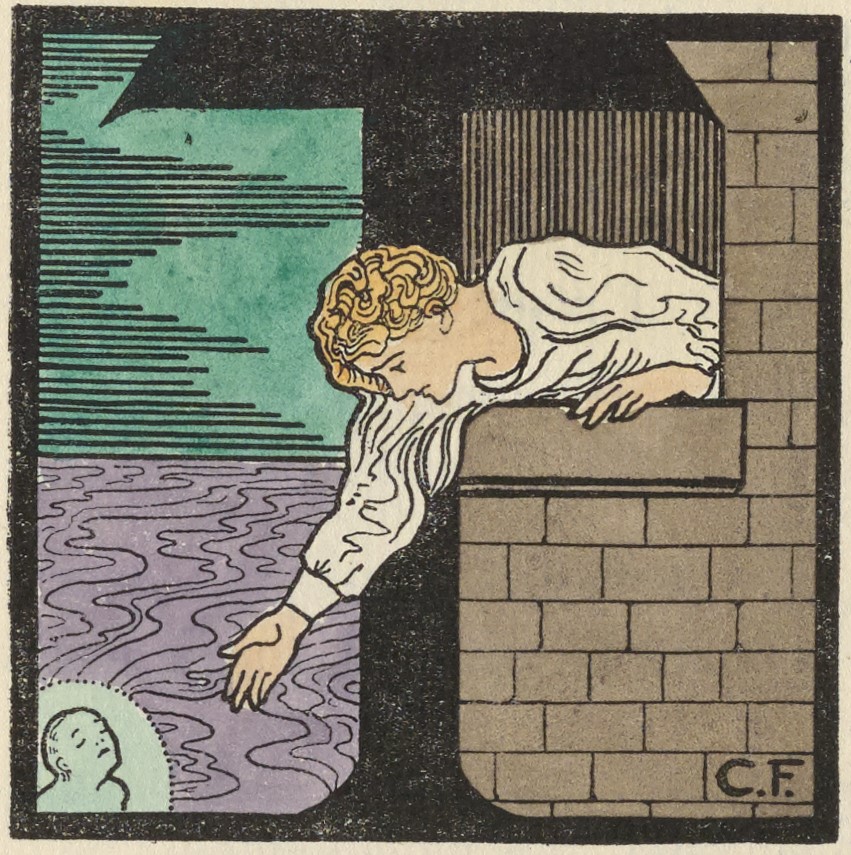
HE cottage stood at the edge of a dreary
swamp. Dark rushes grew at the margin,
and shivered and trembled as the wind
blew through them, seeking to bend them
to the cold surface of the water. Heavy
mists rose slowly from the swamp, mingling
with the twilight, and wreathing themselves
into strange, uncouth forms. And through
the mists across the swamp moved a pale
phantom flame. The child looked through
the cottage window and watched it, and
shivered as he looked. He hated the swamp
and the pale light, and yet it
held him with a strange fascination. Night after night,
when his mother
thought him sleeping, he crept from his bed and sat with his little
pale face
pressed against the tiny window. The light drew him, and he had to go.
He knew what it was though his mother had never told him. The
children had whispered it when he went to the School that lay in the
bright village right away on the other side of the swamp. And ever since,
he had watched night after night the pale light which he now knew was the
soul of his little sister who had died unbaptized. He dared not tell his
mother for she cried when the little nameless one was mentioned, but he
thought the more. It was there to-night, clearer than usual, and the child
sat watching. It must be so lonely, the little wandering soul. He sought
for it often by day but never found it. If he could have spoken to it, if it
could have told him that it knew he watched at the window he might
have been happier. He wished he knew. He pushed back the lattice,
and leaning his face on his hands stared out into the night. There down
away on the swamp was the light. He could see it quite plainly in spite of
the mists across the marshy ground.
The Green Sheaf
“Little baby,” he whispered, “I am watching. Oh! do you hear!
I am watching.”
But the wind only moaned gently round him, bringing no answer
to the little lonely figure.
“Baby!” he called again, and his voice broke with a sob.
“It’s no use,” he said softly, “she can’t hear, I must go.”
Slipping on his clothes he stole softly down the narrow stairs, and
out at the door.
How lonely and dark it was. His lips trembled and the tears
filled his eyes, but he went bravely forward. Now he seemed quite near
the light, but as he moved it went away.
“Baby!” he called, “don’t go, I am coming, baby!”
But still the light moved on.
“Baby, I won’t hurt you, I only want to have you in my arms. You
were so little, and it must be so lonely.”
A little further he went, and stretched out his arms. A cry as the
cry of a wounded curlew broke the stillness of the night. Then silence,
deep, impenetrable, settled over the lonely marsh.
Leslie Moore.
HAND COLOURED PRINTS by Pamela Colman Smith, of
Miss Ellen Terry:—
as “‘Portia’ hurrying to the Railway Station” … … Price Is. Post free.
as “Sans Gêne” … … … … … … ” Is. ”
as “Queen Katharine” … … … … … ” 2s. 6d. ”
as “Mistress Page” … … … … … … ” 2s. 6d. ”
as “Hiördis” (in the Vikings) … … … … ” 2s. 6d. ”
Subscribers to The Green Sheaf may obtain this last print for Is. Post free.
The Green Sheaf School of Hand Colouring, undertakes small Editions of
Books, Programmes, Cards, etc., for private Theatricals and Dances, also cards for
advertising
purposes. The School supplies the designs and executes the orders complete where desired.
For further particulars apply to The Editor, The Green Sheaf, 14 Milborne Grove, The
Boltons, S.W.
⎯
From ELKIN MATHEWS’ LIST.
A BROAD SHEET—For the Year 1902: With Pictures by Pamela
Colman Smith and Jack B. Yeats. Hand-coloured. Twelve numbers, post free,
12s. 6d. net.
AUBREY BEARDSLEY’S DRAWINGS. A Catalogue and a List of
Criticisms. By A. E. Gallatin. With Plates, some hitherto unpublished. Demy 4to,
12 by 9 inches. £1 net. Limited to 100 copies for Great Britain. Also a few L.P. copies
interleaved and bound in vellum, £1 10s. net. Both editions printed on hand-made paper.
JACK B. YEATS’S PLAYS FOR THE MINIATURE STAGE.
THE TREASURE OF THE GARDEN: A Play in the Old Manner.
By Jack B. Yeats. With Illustrations coloured by the Author. 4to. 5s. net.
JAMES FLAUNTY; or, The Terror of the Western Seas. A Drama
in the Old Manner. By Jack B. Yeats. With Illustrations (wrapper hand-coloured)
by the Author. Fcap. 8vo. Is. net. Copies coloured throughout by the Author may be
had, price 5s. net.
JOURNAL OF EDWARD ELLERKER WILLIAMS, Companion of
Shelley and Byron in 1821 and 1822. With an Introduction by Richard Garnett, C.B.,
LL.D. With Collotype Portraits, &c. Crown 8vo, 3s. 6d. net.
“Of deep interest to all lovers of Shelley. The complete diary of the famous ‘Williams,’
the friend of Shelley
and Byron for eighteen months in 1821-22, and Shelley’s companion in death. Hitherto
in its entirety known
only to biographers of the poets, now made available to all.”&Outlook.
THE WIND AMONG THE REEDS. By W. B. Yeats. Crown
8vo, 3s. 6d. net. [Fourth Edition.
WITH ELIA AND HIS FRIENDS IN BOOKS AND DREAMS.
By John Rogers. Globe 8vo, 2s. 6d. net.
“It does not fall to the lot of many men to possess on their library shelves ‘volumes
enriched by the auto-
graphs of Lamb and his friends.’ Still fewer could write about their former owner
with the charm, discrimination,
and sympathy shown by Mr. Rogers in his book&where quaint and beautiful thoughts,
as well as sound criticism
will be found.”&Manchester Courier.
⎯
London: ELKIN MATHEWS, Vigo Street, W.
15The Green Sheaf
THE GALLERY, ONE PRINCE’S TERRACE,
HEREFORD ROAD, W.
JOHN BAILLIE requests the honour of a visit. Exhibitions every
three weeks.
A fine Collection of Modern Jewellery always on view.
Classes for Enamelling, Metal-work, Carving, Bookcasing, Water
Colours, Fan Painting, Wood Engraving, &c.
Gallery open 10.30 a.m. to 6 p.m.
⎯
The next number of The Green Sheaf will contain a Story of the
Sea by John Masefield; “Cobus and the Fish,” from The Good Hope,
translated from the Dutch by Christopher St. John; and other
poems and short stories. The poem by L. C. Duncombe-Jewell has
been held over for No. 6.
Drawings by Dorothy Ward, Cecil French, Pamela Colman Smith.
A few proof copies of the Rossetti drawing of Mrs. Stirling are
for sale at Eighteen pence each, post free.
There will be thirteen Numbers of The Green Sheaf in a year,
printed on antique paper and hand-coloured, and the Subscription is
Thirteen shillings annually, post free. Single Copies may be had at
Thirteen pence each.
Edited and Published by PAMELA COLMAN SMITH,
14, Milborne Grove, The Boltons, London, S.W.
ALL RIGHTS RESERVED.
MLA citation:
The Green Sheaf, No. 5, 1903. Green Sheaf Digital Edition, edited by Lorraine Janzen Kooistra. Yellow Nineties 2.0, Toronto Metropolitan University Centre for Digital Humanities, 2022. https://1890s.ca/gsv5_all/
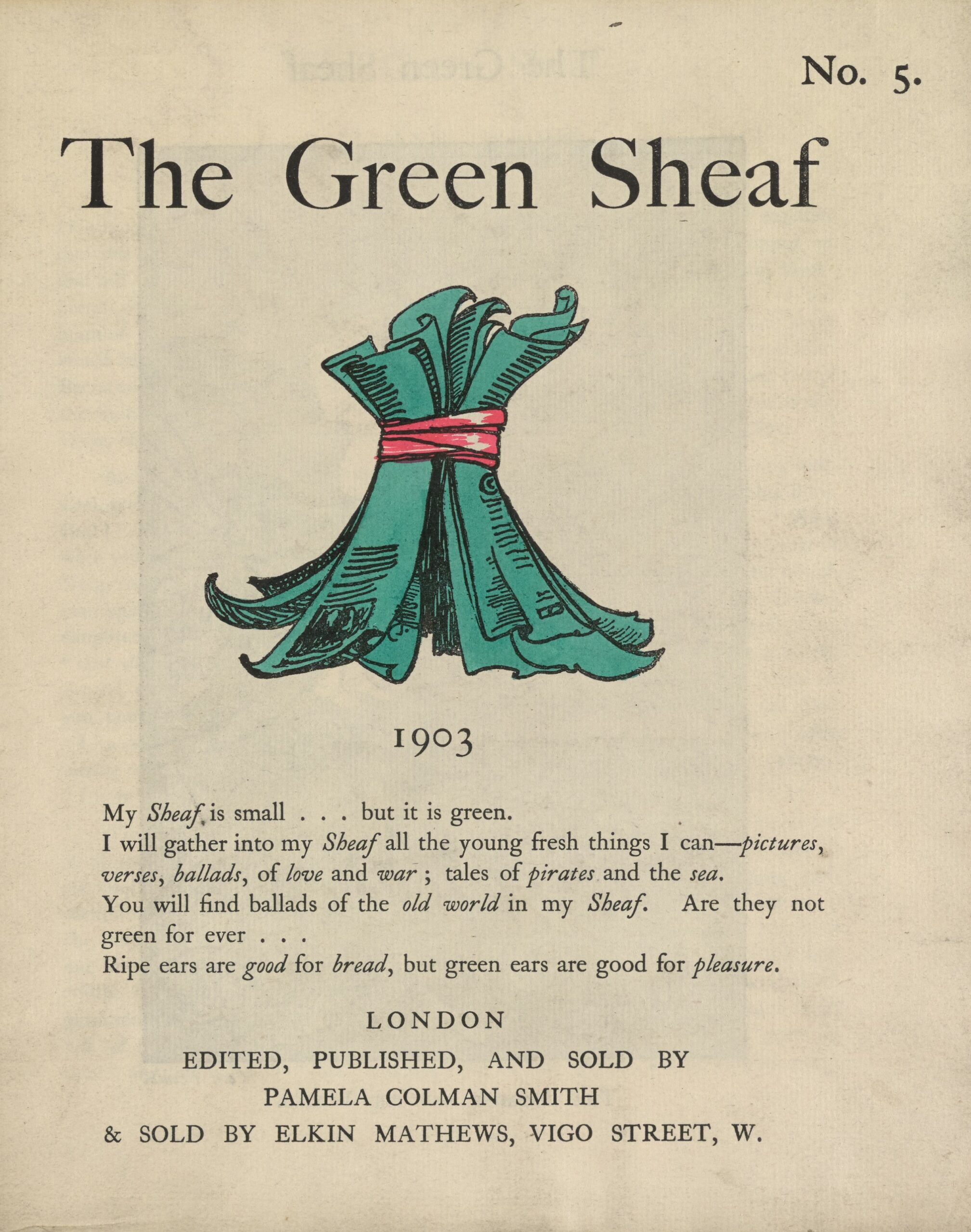
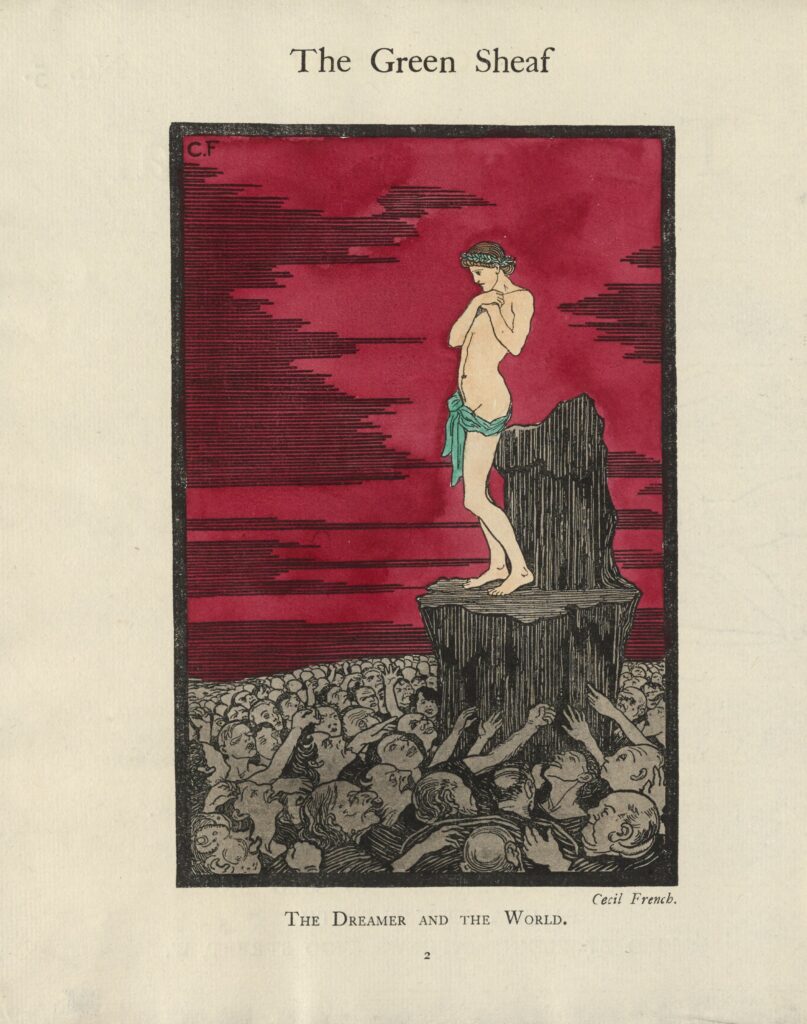
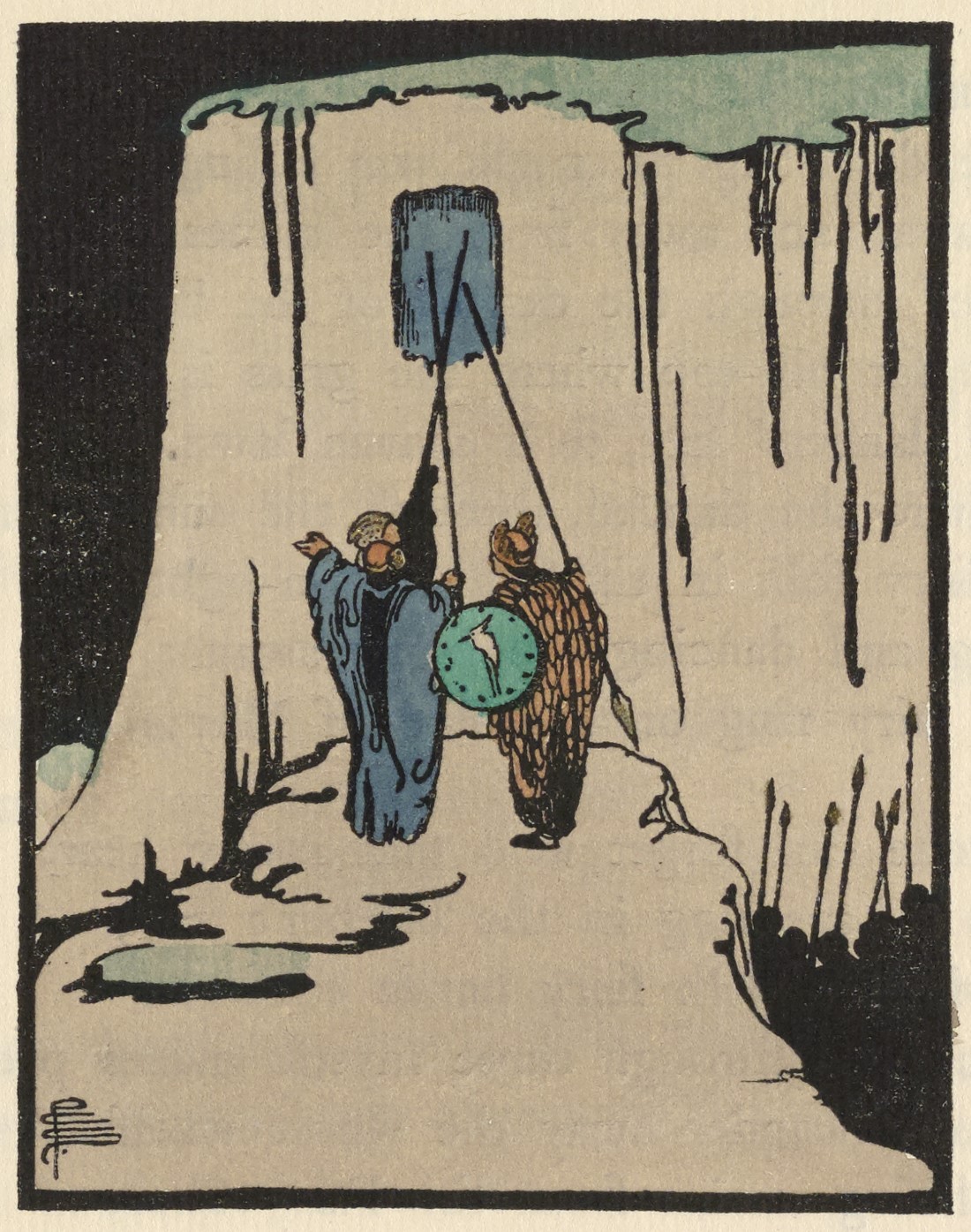

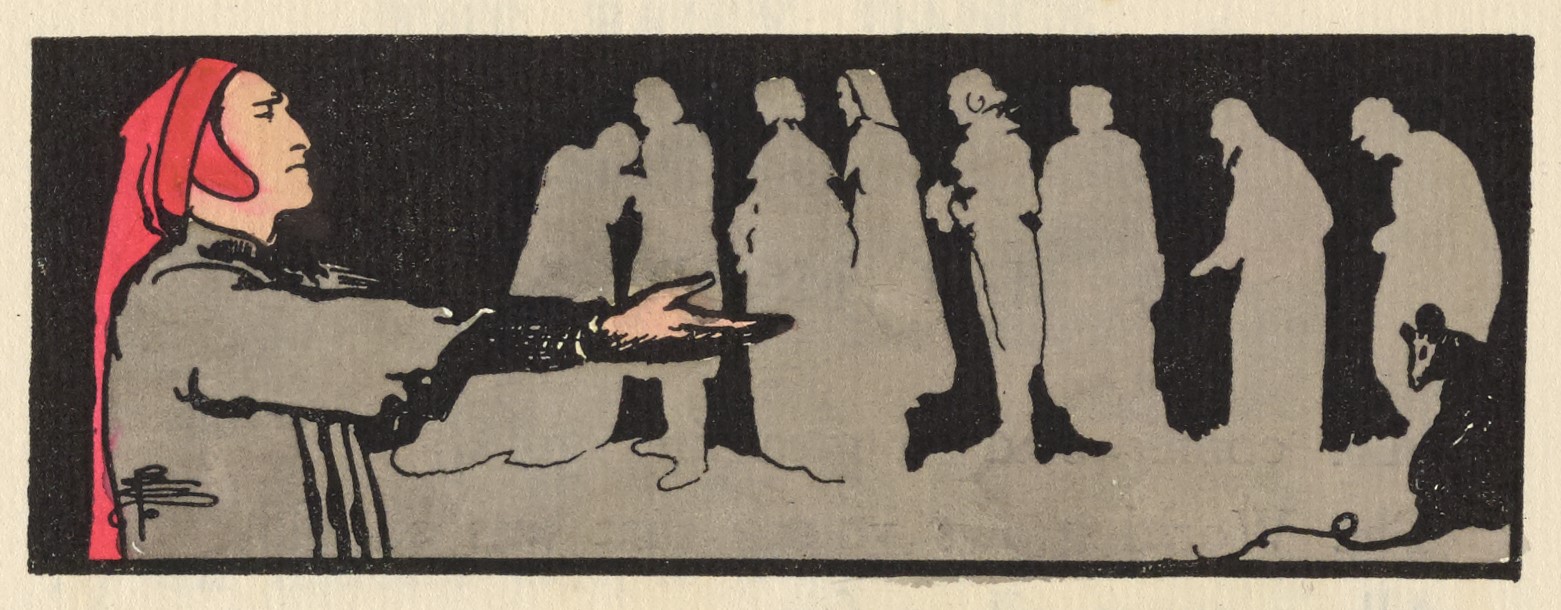
![GSV5-colman-smith-lyceum-illustration-p9 This half-page coloured illustration, centered above the text, appears on the second page of “The Lament of the Lyceum Rat,” by Mary Brown. Outlined in a black rectangular border in portrait orientation, the image depicts four figures in costume on a stage [likely in a performance of Victorian Sardous’ play on Dante]. The three standing figures face left, in profile, while the kneeling woman faces right. In the centre foreground, a man in a long gray robe and red medieval hat holds the hands of the woman who kneels at his feet. His pale face is the only one rendered in full colour; the faces and bodies of the other three figures are the same brown shade as the background. Behind him is a man wearing a crown, and holding a spear and golden shield. The gold shield appears to be a halo surrounding the head of Dante, the man in the red hat played by Henry Irving. These two male figures are followed by a woman in long robes carrying pink flowers, with a crown of flowers atop her head. Behind the figures, in the bottom left of the image, is a small doorway with a barred window. The artist’s monogram is at the bottom right of the frame.](https://1890s.ca/wp-content/uploads/GSV5-colman-smith-lyceum-illustration-p9.jpg)
